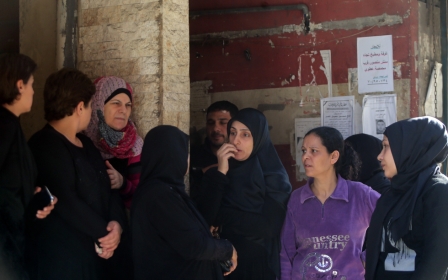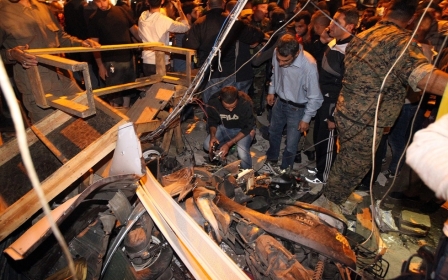The ‘Hezbollah stronghold’: Dehumanising Dahiyeh

Imagine, for one moment, that on 11 September 2001, you turned on your television set to find the following news headlines: “Headquarters of murderous American war machine hit by attacks”; “Epicentre of US financial exploitation rocked by blasts”; “Many deaths as planes hit belligerent global hegemon”.
Chances are you’d view such renderings as al-Qaeda-inspired propaganda and a repulsive affront to the civilians who perished.
When it comes to brutal attacks on cities further from home, however, this exact sort of media approach is shamelessly allowed to fly. It helps, of course, when the people on the receiving end of the attacks have already been so dehumanised as to eliminate the option for civilian identity. Think Iraq or Afghanistan - where, in November of 2001, New York Times foreign affairs columnist Thomas Friedman took the liberty of placing “Afghan ‘civilians’” in quotation marks in order to excuse their slaughter by the US.
Nowadays, Lebanon is an increasingly frequent victim of media efforts that are at once sloppy and pernicious. This is particularly true in the case of Dahiyeh, the southern suburbs of Beirut, which are reduced ad nauseam to a “Hezbollah stronghold”. Google “Hezbollah stronghold” and you’ll see what I mean.
The most recent Google results will pertain to yesterday’s double suicide bombings in the neighbourhood of Burj al-Barajneh, which killed more than 40 people and wounded more than 200. The attacks were claimed by the Islamic State (IS) group.
In a typical account of the event, Reuters explains that the Shia Muslim “Iran-backed Hezbollah has sent troops over the border to support Syrian President Bashar al-Assad against Sunni Muslim insurgent groups including Islamic State”.
And poof, there we have the cause-and-effect relationship, albeit not explicitly stated: Hezbollah went into Syria, so their “stronghold” was bombed. Never mind that Dahiyeh, while indeed boasting a substantial presence of party supporters, also hosts other Lebanese, Palestinians, Syrians, and others of varying religious and political orientations. The Dahiyeh=Shia/Hezbollah formula fails to account for the area’s smaller Christian population, not to mention the fact that, in many parts of the suburbs, you’ll find more flags belonging to the (primarily Shia) Amal Movement than Hezbollah flags.
But for purposes of simplification, the media presents us with a monochrome view. After all, Amal and the Christians don’t carry the same nefarious connotations with which the word Hezbollah has been endowed in the West; thus, delving into the complexity of the situation would simply confuse audiences. (Ditto for explaining the origins of IS, which unlike the forever-“Iran-backed” Hezbollah is not generally deemed to be in need of qualifiers distributing blame among those responsible for its existence, such as the United States).
None of this is to imply, obviously, that were Dahiyeh composed entirely of Hezbollah sympathisers yesterday’s attacks would have been justified. There’s nothing criminal about supporting an organisation that formed in response to Israel’s murderous trampling of Lebanon and that has successfully defended the country from Zionist predations.
Some folks, however, were unabashedly optimistic about the carnage in Burj al-Barajneh. One Everett A Stern, who defines himself on Twitter as “United States Senate Candidate Intelligence Director, HSBC Whistleblower, Social Justice Activist, CEO”, tweeted the following: “I support any attack made against Hezbollah or ISIS. That includes the attack launched today against Hezbollah in Lebanon”.
So much for minor details like the fact that IS claimed the attack - or that it’s usually better to keep your enthusiastic support for terrorism to yourself.
In response to Stern’s proclamation, another Twitter user posted a picture of a smiling little girl, one of the day’s casualties, with the comment that she “does look like a Hezbollah mastermind”.
Beyond the unquantifiable individual and communal suffering that will continue in the wake of these atrocities, there will be other ramifications. The overzealous measures that already often characterise the security regime in Lebanon, for example, presumably stand to get bumped up a notch, inviting ever more expansive profiling opportunities. (For precedents on this front, see last year’s arrest of Lebanese rapper Hussein Sharaffedine on suspicion of terrorism. His crime: visiting a mechanic in Dahiyeh while dressed in something resembling “modern Mexican attire”, as his suspicious clothing was reportedly described by Lebanon’s anti-terrorist unit.)
One effect of heightened security, meanwhile, is an increase in public suspicion of the “other” - which naturally only serves to complicate societal harmony in multi-sectarian polities. But for those regional actors seeking to make a self-fulfilling prophecy out of an apocalyptic sectarian showdown, the more discord, the better.
- Belen Fernandez is the author of The Imperial Messenger: Thomas Friedman at Work, published by Verso. She is a contributing editor at Jacobin magazine
The views expressed in this article belong to the author and do not necessarily reflect the editorial policy of Middle East Eye
- Belen Fernandez is the author of The Imperial Messenger: Thomas Friedman at Work, published by Verso. She is a contributing editor at Jacobin magazine.
The views expressed in this article belong to the author and do not necessarily reflect the editorial policy of Middle East Eye.
- See more at: http://www.middleeasteye.net/columns/lebanon-s-landscape-refugee-despair-1763860319#sthash.qNBwDPWR.dpuf- Belen Fernandez is the author of The Imperial Messenger: Thomas Friedman at Work, published by Verso. She is a contributing editor at Jacobin magazine.
The views expressed in this article belong to the author and do not necessarily reflect the editorial policy of Middle East Eye.
- See more at: http://www.middleeasteye.net/columns/lebanon-s-landscape-refugee-despair-1763860319#sthash.qNBwDPWR.dpufPhoto: A relative of Samer Huhu, who was killed in a twin bombing attack that rocked a busy shopping street in the area of Burj al-Barajneh, waves his portrait as she mourns during his funeral in the southern suburb of the capital Beirut on 13 November, 2015 (AFP).
New MEE newsletter: Jerusalem Dispatch
Sign up to get the latest insights and analysis on Israel-Palestine, alongside Turkey Unpacked and other MEE newsletters
Middle East Eye delivers independent and unrivalled coverage and analysis of the Middle East, North Africa and beyond. To learn more about republishing this content and the associated fees, please fill out this form. More about MEE can be found here.





